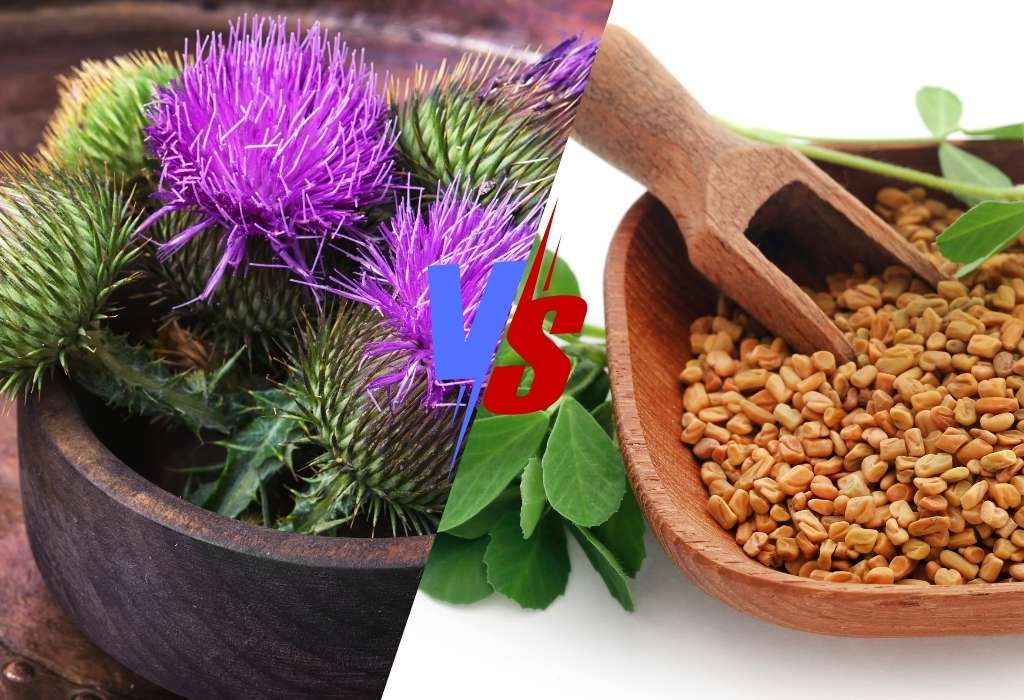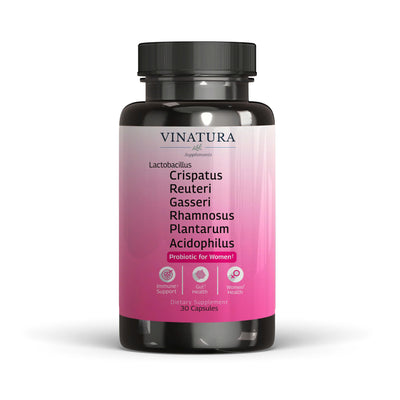
Milk Thistle Vs. Fenugreek: Which Herb Is Better For Milk Supply?
Milk Thistle and Fenugreek are two popular choices among breastfeeding mothers for maintaining milk supply. However, do these herbs live up to their reputation regarding effectiveness, benefits, and side effects? Through today's article, let's explore and compare Milk Thistle and Fenugreek more closely.
Before exploring further, please read the disclaimer located at the end of this webpage.
Key Takeaways
- Fenugreek has been extensively studied in increasing milk production in breastfeeding women.
- Milk Thistle may have moderate to minimal effectiveness in enhancing milk supply. However, this herb is known for its long-term liver health benefits.
- Both of these herbs are effective in increasing milk supply. However, Fenugreek has a shorter milk supply increase time (12-24 hours).
About Fenugreek

Fenugreek (or Trigonella foenum graecum) is a familiar herb used in traditional medicine and cooking. It originates from South Europe, North Africa, Asia, and the Mediterranean. It is now commonly cultivated in Morocco, India, and Egypt.
This plant is also known for its therapeutic effects, supporting conditions such as fever, tuberculosis, and cellulite. Particularly, Fenugreek can stimulate milk production, serving as a valuable aid for mothers facing insufficient milk supply, effectively boosting milk production immediately.
However, when used at high doses (>25 mg/day), Fenugreek can cause adverse reactions, especially in women with diabetes or those using warfarin. According to surveys among mothers in the United States, 45% experienced gastrointestinal issues, weight gain, altered urine and sweat odor, and changes in stool consistency. [1]
How Does Fenugreek Increase Milk Supply Production?
The main compound phytoestrogen (primarily isoflavones such as genistein, diosgenin, and protodioscin) found in Fenugreek is a plant chemical with a role similar to the hormone estrogen. These phytoestrogenic compounds are essential in stimulating milk ducts and promoting milk production in women. [1]
Moreover, numerous studies and surveys have shown that Fenugreek has significant effects on increasing milk supply:
- A survey involving 188 breastfeeding women from various states yielded results where 54% reported an increase in milk supply with Fenugreek, while others reported common side effects. [1]
- A study in Thailand involving over 50 breastfeeding women who consumed capsules containing 200 mg of Fenugreek showed promising results. After two weeks, their milk supply increased by an average of 49%, and 103% after four weeks. [1]
Read more: Berberine vs Milk Thistle: Which Is Better For Liver and Metabolic Support?
About Milk Thistle

Milk thistle (or Silybum marianum) is an herb derived from plants in the aster family and is native to Mediterranean countries. It has been used in traditional medicine for over 2000 years and is not typically used in cooking.
Milk thistle is well-known for its liver-protective and health-enhancing properties due to its main compound, silymarin. However, this herb also has effects in promoting lactation for breastfeeding women, as several studies have demonstrated its ability to increase milk production. [2] [3]
Because milk thistle is considered natural and generally safe to use, its mild side effects usually involve digestive disturbances or diarrhea due to unfamiliarity with dosage.
Does Milk Thistle Help to Increase Milk Production?
The answer is yes. Currently, several studies have shown that milk thistle has a moderate to mild effect in enhancing milk production. One study demonstrated a significant difference in milk volume between groups using and not using milk thistle, with the herbal group showing notably higher milk production [3].
Additionally, a study involving over 50 postpartum mothers indicated [2]:
- After 30 and 63 days of using silymarin (the main compound in milk thistle), average milk production significantly increased compared to the group not using it.
- Specifically, after 30 days, milk production was 990 grams in the silymarin group compared to 650 grams in the non-user group. After 63 days, milk production was 1110 grams in the silymarin group and 701 grams in the non-user group.
Read more: Turmeric Vs. Milk Thistle: Which Is Better for Liver Health?
Is Milk Thistle and Fenugreek Safe for Lactating Mothers?

Although there have been no recorded cases of pregnant women experiencing severe reactions from using milk thistle and fenugreek, Dr. Donna Seger, director of the Tennessee Poison Center, has shared some perspectives on this issue:
- Regarding Fenugreek: This plant can cause oxidative toxicity and hypoglycemia, so it is recommended not to use fenugreek during pregnancy and breastfeeding.
- Regarding Milk Thistle: There are no studies on this issue, but milk thistle also has potential side effects.
Therefore, when using these two herbs during breastfeeding, it is best to follow the recommended dosages from a doctor for a specified period to maximize the benefits of both herbs.
Milk Thistle Vs Fenugreek: Which Herb Is Better?
Choosing which herbal remedy is better depends largely on factors such as the intended use, body condition, and individual reactions. However, in general, we can outline specific differences to help you make an informed decision:
For lactation support:
- Fenugreek: Clearly enhances milk production, with potential effects seen within 12-24 hours of use.
- Milk thistle: Provides moderate to minimal support for milk production, coupled with benefits for liver health and long-term safety.
For overall health:
- Fenugreek: Offers benefits like increased milk production, improved digestion and inflammation reduction.
- Milk thistle: Focuses more on enhancing overall body health and liver protection, alongside antioxidant effects and digestive improvements.
Regarding side effects:
- Fenugreek: Common side effects include allergic reactions like rash and difficulty breathing.
- Milk thistle: Side effects are generally mild, such as nausea and mild digestive discomfort.
Therefore, for enhancing milk production, Fenugreek holds an advantage, whereas Milk Thistle excels in promoting comprehensive health protection. Regarding side effects, Fenugreek is noted for potentially causing more severe allergic reactions compared to Milk Thistle.
How to Use Fenugreek and Milk Thistle to Increase Milk Supply?
To maximize the effectiveness of these two herbs in enhancing milk production, I suggest the following usage guidelines for each:
Fenugreek: Take it in capsule form, tablets, or as supplements in tea or powder form, with a maximum dosage of 1725 mg daily, divided into three doses. [1]
Milk Thistle: Use it in standard forms such as capsules or as a supplement in tea, with a recommended dosage containing approximately 252 - 600 mg of the main compound silymarin, divided into three daily doses. [2]
Please note: The dosages above are for reference purposes only. It's essential to consult a healthcare professional to ensure the best results.
Other Herbal Supplements for Milk Production
In addition to the two herbs analyzed in the sections above, you can also consider several other herbs known for enhancing milk production:
Blessed Thistle (Cnicus benedictus): This is also a well-known herb for increasing lactation, often used alongside Fenugreek by breastfeeding mothers.
Fennel (Foeniculum vulgare): Known for stimulating milk glands and improving digestion effectively.
Alfalfa (Medicago sativa): With hormone-balancing properties and the ability to enhance milk production, this is also a helpful choice.
These herbs can be used alone or in combination to maximize their effectiveness in increasing milk supply. However, consult with a healthcare provider to ensure safety and efficacy.
Milk Thistle and Blessed Thistle: Which is Better for Milk Supply?

To maximize the effectiveness of these two herbs in enhancing milk production, I suggest the following usage guidelines for each:
Fenugreek: Take it in capsule form, tablets, or as supplements in tea or powder form, with a maximum dosage of 1725 mg per day, divided into three doses. [1]
Milk Thistle: Use it in common forms such as capsules or as a supplement in tea, with a recommended dosage containing approximately 252 - 600 mg of the main compound silymarin, also divided into three doses per day. [2]
Please note: The dosages above are for reference purposes only. It's important to consult with a healthcare professional to ensure the best results.
Conclusion
For breastfeeding women, milk thistle and Fenugreek are potent allies in improving milk supply and stimulating lactation. However, to achieve the best results, it's still advisable to consult with a doctor for appropriate dosage and usage recommendations based on your individual goals and physical condition.
References
- [1] Fenugreek Drugs and Lactation Database Last Revision: May 15, 2024.https://www.ncbi.nlm.nih.gov/books/NBK501779/
- [2] Milk Thistle Drugs and Lactation Database Last Revision: March 15, 2023.https://www.ncbi.nlm.nih.gov/books/NBK501771/
- [3] The Effect of Herbal Medicine on Breast Milk Production: An Overview of Systematic Reviews https://www.health-providers.ir/article_170254_4c5bc5143ffd848db13e8152e1049e81.pdf
Author

Product Disclaimer
Including an ingredient or study does not evaluate, endorse, or recommend any Vinatura product or any third-party product. Some ingredients discussed may not be used in any Vinatura product.
The content of the articles has not been evaluated by the Food and Drug Administration (FDA) and is not intended to promote or endorse any specific product. Any products sold on this website are not intended to diagnose, treat, cure, or prevent any disease.
Opinions and Endorsements
Any claims, statements, or opinions expressed in the articles are those of the author(s) and do not necessarily reflect the views or opinions of the manufacturers of the dietary supplement products. The products sold on this website are separate from the content of the articles and are not directly endorsed or associated with the information presented here.
Liability Disclaimer
The author(s) of the articles, website, and manufacturers of the dietary supplement products do not assume any liability for any potential consequences arising from the use of the information provided in the articles. Ingredient effects, dosages, and safety vary by individual, formulation, and context; some ingredients interact with medications or may be unsuitable during pregnancy or lactation. It is recommended that individuals consult with a qualified healthcare professional before making any dietary or lifestyle changes, including the use of dietary supplements.
Product Usage
Please refer to the product labels and packaging for specific usage instructions and guidelines for the dietary supplement products sold on this website.
Customer Support
For any concerns or questions regarding the dietary supplement products, please contact our customer support team, who will be more than happy to assist you.





Leave a Comment
Be the first to comment.
What do you think?